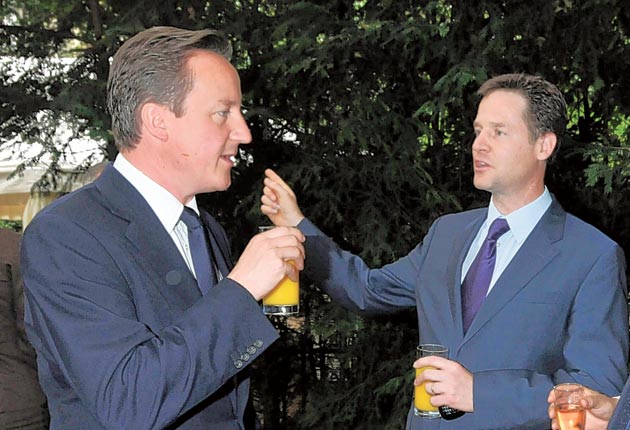Andrew Grice: A vote on AV will test the coalition but not destroy it
Inside Politics

Conservative MPs grumble in the Commons tea room: those bloody Liberal Democrats are calling the shots, forcing William Hague to cuddle up to Europe, Kenneth Clarke to say that prison doesn't work and David Cameron to call a referendum on electoral reform that would damage Tory prospects.
Nearby on the terrace, Liberal Democrat MPs complain that Nick Clegg is giving Mr Cameron too much and taking too too little. The whingers' latest theory is that the Budget was more severe than the Tories would have dared to make it if they were governing alone, without Liberal Democrat "cover" – hardly a good advert for the third party. They fear the referendum next May will be lost and want Mr Cameron to show his commitment to the coalition by campaigning for a Yes vote. It seems they will be disappointed, although he may take a back seat in the campaign rather than a head-to-head role against Mr Clegg.
Backbench whingeing is natural in coalition politics. With complaints on both sides of the fence, maybe it shows the Prime Minister and his deputy are getting it right. What is surprising is that more of the complaints are not made in public. "We don't want to be blamed for wrecking the coalition," a Tory diehard explained. The $64,000 question is what a Cameron Government would have been like if he had won an outright majority. We don't know, though we might find out after the next election. My hunch is it would not have been very different to what we see now. True, no referendum on the alternative vote (which Mr Cameron had to offer Mr Clegg in the post-election negotiations as Labour had already done so). True, no £1,000 rise in tax thresholds in the Budget; instead, the Tories would have reversed the national insurance rise for employees.
But having watched Mr Cameron up close on his recent visits to Brussels and Canada, the abiding impression he made was as an arch- pragmatist. Clearly, a coalition requires flexibility and give-and-take, so he is well suited to the task of heading one. Yet I suspect that this week's pragmatic foreign policy and hard-nosed realism on prisons would have happened anyway. Mr Cameron has not been dragged to the centre by the Liberal Democrats; he intended to govern from there anyway. New Labour's strategic triumph was to dominate the centre ground and push the Tories out to the right.
The Tories walked into the trap, the Cameroons believe. Mr Cameron always intended to turn the tables by pushing Labour out to the left. The coalition with the Liberal Democrats wasn't planned, but it may make his task easier. The candidates in Labour's leadership election could make the same mistake as the Tories after 1997, as they fish for Labour votes, apparently forgetting that they will soon need to appeal to the wider electorate. The Prime Minister is alive to Liberal Democrat sensitivities. "This is not a Conservative government with a sort of Liberal Democrat appendage," he told a radio phone-in this week. "I want people who voted Liberal Democrat to know that they are not being taken for a ride in some way—they are absolutely not. I don't take steps without consulting Nick—we work very, very closely together. It really is a partnership; it is not one plus a half, it is one plus one."
Indeed, the latest ComRes poll for The Independent suggests that many people who voted Liberal Democrat think they are on a journey for which they did not want a ticket. Fewer than seven out of 10 people who supported them in May say they would do so again. Mr Clegg hopes that his victory in securing an early referendum may allay fears in his party and the public that he was wrong to hop into bed with Mr Cameron. Some Tories wanted to delay the referendum; to keep the Liberal Democrats on board for longer. Mr Clegg will be able to trumpet the public vote as a clear sign that his party is making a real difference.
Yet the referendum is not without dangers. "It is the point of maximum risk for the coalition," one Tory insider said yesterday. Only one side can win and so either the Tory grumblers or the Liberal Democrat whingers will be disappointed. If the public vote Yes to the alternative vote Tory MPs, fearing their party will lose seats, will be tempted to take revenge on the coalition on other issues. If people vote No, some Liberal Democrats will say Mr Clegg has got little to show for propping up the Tories and he may come under pressure to pull out of the coalition.
There will be many predictions that a No vote would bring the coalition crashing down. I am not so sure. The coalition's collapse might well result in a general election at the worst time for the Tories and Liberal Democrats, just when they had gone through the pain barrier of raising VAT, curbing state benefits and imposing spending cuts. The ship would be in dangerous waters, but Mr Cameron and Mr Clegg would probably be able to steady it.
The grumblers and the whingers may have a few more years of complaining ahead of them yet.

Join our commenting forum
Join thought-provoking conversations, follow other Independent readers and see their replies